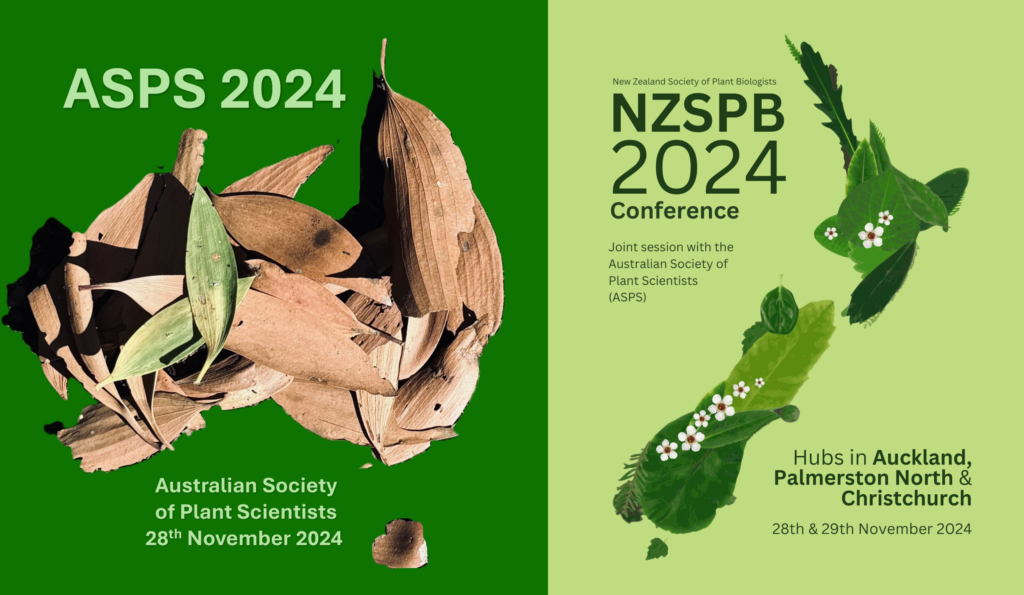- About
- Members
- Join
- Member log in
- Membership Renewal
- Member directory
- Life Members
- ASPS Life Member Professor Graham Farquhar
- ASPS Life Member Associate Professor Hendrik (Hank) Greenway
- ASPS Life Member Dr Marshall (Hal) D Hatch
- ASPS Life Member Dr Paul E Kriedmann
- ASPS Life Member Dr Mervyn Ludlow
- ASPS Life Member Emeritus Professor Rana Munns
- ASPS Life Member Conjoint Professor Christina E Offler
- ASPS Life Member Professor (Charles) Barry Osmond
- ASPS Life Member Emeritus Professor John W Patrick
- ASPS Life Member Dr Joe Wiskich
- Corresponding Members
- Elected Fellows
- Events
- Awards & Funding
- Employment
- Publications
- Research
- Teaching
- Menu
August 2024 Phytogen
28 August 2024
Welcome to the August 2024 edition of Phytogen!
Remember to register and/or submit an abstract for your local ASPS hybrid conference happening in late November. For more info, register or submit an abstract click HERE
This issue we are celebrating the achievements of two amazing scientists, Prof Ros Glendow who was elected to the Australian Academy of Scientist, and Prof Keiko Torii who was awarded the Purple Ribbon in Japan. We also have a Science Meets Parliament 2024 report, a contribution from ASPS Cell Biology Representative and we continue to highlight our students awardees of the travel grant of the International Plant and Molecular Biology (IPMB) conference held in Cairns in June.
Lastly, we continue to spotlight our student members with our dedicated section launched last month. This issue, we have Lucas Auroux, a PhD student at LaTrobe University who is also the student representative of the Website and Communications Sub-Committee (WCSC) and co-editor of Phytogen. Students, if you would like your work highlighted in Phytogen and our social media, please contact Phytogen editors Razlin (razlin.azman@csiro.au) or Lucas (l.auroux@latrobe.edu.au).
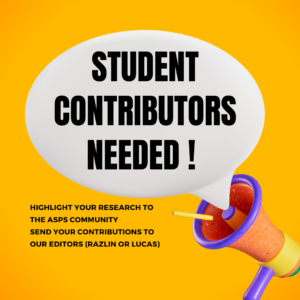
Celebrating achievements of ASPS community
“On behalf of ASPS, I congratulate Ros and Keiko on their elections to their respective national academies of science. I would also like thank both for being engaged and active members of ASPS. They have made valuable contributions to our awards processes and the promotion of our Society. Their desire and excitement to understand the biology of plants is an inspiration for all plant scientists and they are exceptional role models for early-career researchers. It is wonderful and absolutely fitting that their achievements have been recognised at these high levels”
Prof Martha Ludwig, ASPS president
Prof Ros Glendow
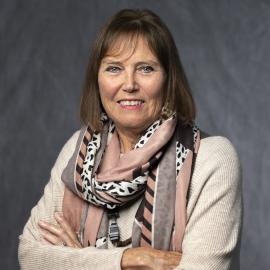
On behalf of the editorial team, I congratulate and celebrate Ros’ election as a Fellow of the Australian Academy of Science in 2024. With such a distinguished and impactful career, it’s hard to summarise and pay tribute to all she has done for plant science research and teaching. Ros has been a key figure in the Monash Agtech LaunchPad, Australian Academy of Science’s Committee for Agriculture, Fisheries and Food, and Australian Plant Phenomics Facility just to name a few. In addition, she was the president of ASPS (2010 – 2012) and Global Plant Council (GPC; 2018 – 2019). She served the ASPS in as a discipline representative several times and is a regular participant at our conferences. She was awarded life membership of ASPS in 2018 and was the JG Wood Lecturer in 2019. Look out for the “Konzo: Forgotten but Not Gone” webinar on September 5th, 2024, hosted by the Global Plant Council where Ros will be interviewing Dr Julie Cliff on Konzo, a neurological disease linked to the consumption of improperly processed cassava. Click HERE to register.
Ros is an ecophysiologist, and a world leader in the field of cyanogenesis, investigating the process of cyanide release in plants in response to herbivory. Using cyanogenesis as a model, she has integrated opposing theories of plant defence into a single overarching theory demonstrating that these bioactive compounds are intricately involved in nitrogen management within the plant, and that this is the evolutionary driver, not herbivore resistance. Her work explains why so many crop plants are cyanogenic and helps predict changes in nutritional value of plants in response to environmental challenges. Check out her talk on this topic here. She is passionate about plants and the need to communicate the issues around sustainable food production.
Ros was pivotal in leading and transforming the Monash undergraduate program on scientific practice and communication. During her tenure as ASPS president, she established social media presences for ASPS on X (formerly known as Twitter) and Facebook, choosing the handles @asps_ozplants name to distinguish from any other ASPS groups. In celebration of the 60th anniversary of ASPS in 2019 Ros penned this reflection piece. While president of the GPC she worked with plant scientist organisations globally to increase visibility and counter ‘plant blindness’. Ros wrote frequently on this topic and the role of professional societies on global plant research. Ros also talked about her career and her experience on the Global Plant Council’s The Academic Odyssey Series (click for link).
I had the pleasure of speaking to Ros for this edition of Phytogen
Q: Looking back on your career, what do you think was the most pivotal moment in your career, and what advice can you give to the next generation of plant scientists?
A: For me, it was when I was successful in getting my own funding, based on my original idea. For those still early in their career, my advice would be start small. Build up your reputation and learn how to manage project deliverables and budgets. Develop your research and teaching portfolio and look out for prizes and awards
Q: How important are professional societies such as ASPS?
A: Immensely important, they allow you to form networks and form collaborations. It used to be that you would only cross paths with your peers at conferences, where initial discussions could lead to collaborations. But with a global network such as ASPS and GPC, there is an added benefit of connecting to other researchers you may not cross paths with at conferences and meeting. It allows you to think outside your usual space and try something different.
Prof Keiko Torii
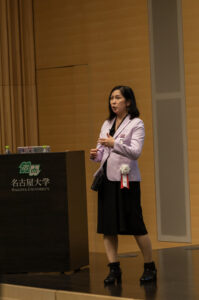
I also congratulate and celebrate Keiko for her Medal of Honor with Purple Ribbon from the Emperor of Japan. The award is a prestigious national honour awarded for contribution to the academic and artistic development of Japan. Keiko has been honoured numerous times in Japan with the Asahi Prize in 2021, Saruhashi Prize in 2015, Inoue Prize for Science in 2015 and Science Lectureship Award from Chiba University in 2014. Internationally, she has been recognised with the Stephen Hales Prize from American Society of Plant Biologists and Bateson Lecture from John Innes Centre, both in 2023. In 2012, she was elected to the American Association for the Advancement of Sciences (AAAS), follow by election to the American Society of Plant Biologists in 2015, and this year was elected to the National Academy of Science (USA).
If you take a look at her profile at the University of Texas where she is the Johnson & Johnson Centennial Chair in Plant Cell Biology since 2011, one cannot help but be inspired by this amazing scientist. Since 2011, she is a Howard Hughes Medical Institute and Betty Moore Foundation (HHMI-GBMF) investigator, an endowment that recognises innovative plant scientist researchers. Until 2022, she also ran second lab at the Institute of Transformative Biomolecules (WPI-ITbM) at Nagoya University, Japan as an Oversea Principal Investigator.
The Torii lab researches stem cell maintenance and the cell-to-cell communication required to correctly pattern tissue during development, focusing on stomatal development as a model. Her work on cell-to-cell communication has also focused on the mechanisms that determine organ size and shape in plants. Some of her achievements include discoveries of key signalling ligands, receptor kinase signalling pathways, and master regulatory transcription factors that specify stomatal patterning and differentiation. Her research and collaboration ranges from cell-cell signalling in plant development to maintenance of lineage-specific stem cells, influence of extrinsic peptide and chemical signals in cell-fate decisions and patterning, and creation of an artificial ligand–receptor system to manipulate plant developmental signalling.
A browse of the Torii lab webpage clearly shows that she understands how important it is to communicate your science. Probably one of the best lab websites out there! In addition, she is also active on X (@KeikoUTorii). Checkout this video of Keiko giving a talk for the Gatsby Plant Science Summer School 2022, showcasing her ability to communicate her complex research. In another video, Keiko talks about her life, research and her success after relocating from Japan to America. With her numerous awards, Keiko is an inspiration to us all. Hopefully, one day we can welcome her to Australia for an ASPS conference.
Section written by Razlin Azman, co-editor Phytogen.
Science Meets Parliament 2024 Report
Report by: Nijat Imin, School of Science, Western Sydney University.
I co-represented the Australian Society of Plant Scientists (ASPS) at Science Meets Parliament (SMP) in March 2024. Science Meets Parliament (SMP) is a national gathering of STEM professionals designed to foster closer collaboration between STEM professionals and the nation’s decision-makers, shaping better policies for the future. Over 360 delegates and more than 90 parliamentarians participated in the event. The goal is to increase communication and collaboration between these two groups. As noted by Professor Brian Schmidt during his presentation, “SMP is a unique event in the world that links researchers with policymakers. Solutions need a collaborative, interdisciplinary approach, and policy makers need to make sure their policies are evidence-based”. I found the event to be a valuable experience and enjoyed the sessions. The event’s centrepiece was the Indigenous engagement session, “Next Steps to Elevate and Invest in First Nations Knowledges as a Priority.” Indigenous STEM researchers led a discussion on how to ensure Indigenous knowledge receives dedicated focus within national science and research priorities.
Below are some other highlights.
- Industry and Science minister Ed Husic announced the changes to the Global Science and Technology Diplomacy Fund (GSTDF). Up to $6 million in total grants are now available for Australian researchers to partner with counterparts in Indonesia, Malaysia, Singapore, Thailand, Vietnam, New Zealand, Japan, the Republic of Korea and Brazil.
- Ambassador Caroline Kennedy delivered a speech about collaboration between the United States and Australia on scientific issues. The Ambassador highlights three areas of collaboration: health care, national security, and climate change
- Speaking at the National Press Club today, Science & Technology Australia President Professor Sharath Sriram made a powerful case for rapidly reaching the 3% target to turn Australia into an innovation nation, revealing how to create an innovation ecosystem that will secure the country’s economic future, and warned of the consequences of failing to do so. He discussed the potential economic benefits of this investment. Australia currently spends less than 2% of GDP on R&D. If Australia invested 3% of GDP on R&D, the economy would grow by $100 billion and create 42,000 jobs. A connected innovation ecosystem is key to turning Australian ideas into products. Without this ecosystem, Australia will be a nation of consumers rather than creators.
I had the privilege of dining with the Honourable Warren Entsch, Member of Parliament, along with several other scientists. During the meal, we listened intently as he shared insights into his life’s journey and remarkable career accomplishments. I had the opportunity to visit and interview Member of Parliament Rowan Ramsey. It was fascinating to gain a firsthand glimpse into the work and responsibilities of an elected official. During our insightful discussion, we explored a range of topics related to plants, the environment, and agriculture. I emphasised the paramount importance of plant research, to which Mr. Ramsey voiced his strong agreement and support. It was a wonderful opportunity to engage with our policymakers. Also, it was equally wonderful to be in a room filled with enthusiastic scientists from diverse disciplines and all regions of Australia. There was an abundance of stimulating discussions, and many new connections were forged. I would highly recommend this experience to anyone.
Check out some images from Nijat’s Science Meets Parliament 2024 experience

Cell Biology Representative Update
Dr Crystal Sweetman, Flinders University (South Australia) | Bio: Dr Crystal Sweetman – Flinders University | X: CrystalSweetman
I would like to take this opportunity to introduce the Plant Molecular Physiology group at Flinders University, consisting of several wonderful research leaders working in plant cell and molecular biology. These include Prof. Kathleen Soole, A/Pro.f Peter Anderson, Dr Sunita Ramesh, Dr Yuri Shavrukov, Prof. Colin Jenkins and Em/Prof. David Day. Below, I mention a few recent and exciting activities from within the group.
The first two projects that I’d like to mention, and happen to be involved with, aim to (i) diagnose and (ii) treat (or prevent) oxidative stress in crops. With Professors Soole & Jenkins and researchers at Washington State University, as well as Longreach Plant Breeders and support from the Foundation of Food and Agriculture Research, we are exploring a new, high-throughput phenotyping tool for oxidative stress in wheat based on peroxisome abundance. Meanwhile, alongside A/Prof. Peter Anderson and industry partners Sylvaco and Field Systems, we are exploring the effectiveness of Aussie hardwood pyrolysis products as naturally-derived antioxidant mixtures. These are exciting times in the Flinders laboratories as we investigate cellular indicators of oxidative stress and the mechanisms of treatment strategies for improving stress resilience in crops.

Left: Miss Lauren Philp-Dutton (PhD candidate), Dr Crystal Sweetman and Prof. Kathleen Soole spending time with drought-stressed wheat in the Flinders greenhouses. Middle: Miss Lauren Philp-Dutton and Mr Mitchell Eglinton (Longreach Plant Breeders and Honours student) collecting field samples for peroxisome abundance measurements. Right: Miss Jamie Lowe (Honours student), Dr Crystal Sweetman and A/Prof. Peter Anderson in a Flinders greenhouse with plants used for pyrolysis treatment experiments.
We are also working on two projects dealing with aspects of drought responses in chickpea, one supported by DFAT and the other by GRDC. These projects involve Dr Ramesh, Professors Day & Soole and PhD candidate Katie Schleyer, in collaboration with SARDI and University of Adelaide researchers. Dr Sunita Ramesh has several projects on the go, mainly focussing on plant stress tolerance mechanisms and plant-soil-microbe interactions. This includes a collaborative project with partners at the University of Adelaide on heat stress in wheat, and with post-doc Dr Nick Booth on the role of GABA in cell signalling and stress tolerance. Another major research project for Dr Ramesh and Prof. Day is investigating communication between nitrogen fixing rhizobia and legumes, with Dr Penny Smith at La Trobe and Em/Prof. Steve Tyerman at the University of Adelaide.

Left: Dr Crystal Sweetman, Prof. Kathleen Soole and Miss Katie Schleyer (PhD candidate) with chickpea in the Flinders greenhouses. Middle: Dr Sunita Ramesh and Right: Dr Nick Booth handling wheat samples
Dr Yuri Shavrukov has also been very busy working with genetic markers for various traits in cereals and legumes, particularly with recent Bolashak Fellows from Kazakhstan. Yuri also recently visited multiple institutes in Kazakhstan, making important connections with researchers and executives. We look forward to welcoming more research fellows next month!

Dr Yuri Shavrukov meeting with executives at Kazakh Agrotechnical University, discussing links with Flinders University and a new Kazakh-Australian Innovation Research Centre.
Flinders researchers have recently enjoyed engaging with members of the Ag industry in South Australia, participating in grower days such as “Flinders in the Flinders (Ranges)” as well as PIRSA-SARDI site visits. We also look forward to our first season engaging with the Long Term Trials of Drought Resilient Farming Practices Grant with SARDI, “Soil and microbial amelioration to enhance the drought tolerance of crops”. Incidentally, Flinders has committed a PhD scholarship to this project, so please mention this opportunity to any prospective postgrads in your area!
Now, a final spruik from me as we count down to this year’s ASPS hybrid meeting. The Adelaide node will be held at the new Flinders City Campus in Festival Plaza on Nov 28th and followed by a one-day Workshop on Plant Soil Microbe interactions on Nov. 29th, supported by Flinders’ College of Science & Engineering. Please engage with your society by submitting an abstract and joining us in person this November – I look forward to seeing some excellent plant cell biology (and other) presentations!
Student travel grant awardees report – IBMP Cairns 2024
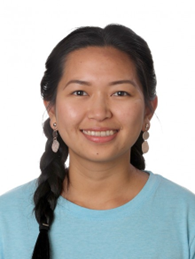
Suyan Yee – ANU (ACT) | X: @scienceYeeSu
I attended IPMB2024 in Cairns last month, with generous support from the ASPS Student Travel Award. There, I presented my ongoing PhD work on cell-specific abiotic stress responses in C4 plants, as part of the ‘Coordinating Photosynthesis’ session. This conference was a great opportunity to connect with the international plant science community, learn about emerging research technologies, and expand my professional networks. A highlight from the talks was the session on ‘Biomolecular Condensates’, where the speakers shared their exciting research on stress-induced subcellular lava lamps, a.k.a stress granules. The IPMB2024 organisers also incorporated ‘Student Night’ into the program to foster networking amongst peers, which was a great way to meet some future academic colleagues. Learning from my supervisors, a key takeaway from attending conferences like IPMB2024 are the knock-on effects it can have, such as the collaborative projects that arise from simple discussions over coffee and pastries.
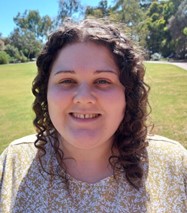
Jordyn Coutts – Monash University(VIC) |X: @JordynCoutts
Attending IPMB2024 was a very worthwhile experience. There was an excellent variety of talks, so that no matter if your interests were in pure or applied research, there were always multiple symposiums of interest at the same time to choose from. I loved that there was research across a variety of model organisms and crops. I could talk with other scientists during the breaks, lunches, poster sessions and dedicated networking events all throughout the conference. This meeting was the perfect opportunity for me to showcase my research and make valuable connections while learning great science.
Guilherme (Yoshi) Yoshikawa – UOA (SA)
With the support of ASPS through the Student Travel Award, I attended the International Plant Molecular Biology (IPMB) Congress in June 2024, in Cairns, and presented a poster. This was a fantastic opportunity to meet international scientists (and finally match faces to prolific international names in my literature review), connect with fellow students, and exchange perspectives on many subjects. The most fruitful interaction for my project, in floral architecture modifications in wheat, was a chat with Prof Vijayraghavan and Dr Peesapati visiting from Bangalore, who have done similar work in rice. On a personal level, I was inspired by the early career advice from A/Prof Demirer, who is visiting from California. To top this experience off, Cairns has astonishing ancient and endangered biodiversity and is right next to the Great Barrier Reef. I’m extremely grateful to ASPS for making it possible to attend an event so important to my career.
Anna Phillipova – UoM (VIC)
I enjoyed IPMB 2024 in Cairns a lot and the travel award from the Society made it possible for me to travel there. It was a great opportunity to connect with the scientific community and share the results of my PhD projects. Networking with scientists from all over the world gave me the burst of encouragement that I especially need now to finish my PhD. I also found this conference was a great platform for inspiring new ideas that would help me plan my future career.
Sonali Koundal – UWS (NSW)
I am delighted to share my wonderful experience at the International Plant Molecular Biology Conference (2024) held in Cairns this year. Firstly, I would like to extend my gratitude to the IPMB committee for giving me the opportunity to present a portion of my research work and selecting for Travel Grant Award. It was an incredible experience to hear about the groundbreaking work being done by renowned researchers and scientists in their respective fields. I presented my talk in the “Carbon Fixation Group,” focusing on how protected cultivation is enhancing the rate of photosynthesis with an emphasis on sustainability in research. I must say, the conference was exceptionally well-organized and meticulously planned, with each session offering its own unique insights and wealth of knowledge. The plenary sessions were particularly outstanding, both at the beginning and the end of the conference, showcasing the meticulous effort put in by the organizing committee. It was also a fantastic opportunity to connect with students and researchers from all over the world, sharing diverse scientific perspectives and areas of interest. Overall, it was an incredible experience to be part of such a remarkable conference.
Student contribution
Lucas Auroux
PhD candidate, La Trobe Institute for Sustainable Agriculture and Food (LISAF – AgriBio research center), Lewsey lab, Department of Animal, Plant and Soil Sciences, School of Agriculture, Biomedicine and Environment, La Trobe university.
Bio: Lucas Auroux Profile | La Trobe University | LinkedIn: Lucas Auroux | X: @AurouxLucas
Guided by an innate sense of curiosity, Lucas Auroux’s studies have taken him around the world to La Trobe University, where he is now undertaking a PhD. “My scientific interest in epigenetics, molecular biology and biotechnology has led me to different cities in France and Germany, and to different laboratories. I have worked with many people who have made me want to continue my studies by showing me different aspects of plant biology research.” “After completing my Masters, I saw a PhD position available in Professor Mathew Lewsey’s laboratory at AgriBio – a world-class facility for agricultural biosciences research and development – to work with Dr Lim Chee Liew.” “The facilities and the quality of the research encouraged me to jump into this new chapter down under.”
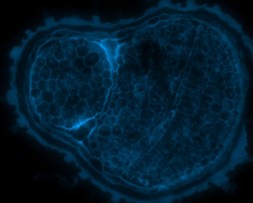
Lucas’ PhD is focused on the area that he loves most: genomics. “I am trying to understand how the genome of each cell of the embryo wakes up in the seed during germination, a crucial step in plant development,” he explains. To do so, Lucas uses cutting-edge technologies in omics and spatial biology, coupled with computational biology. “This research will help us to optimise the germination process in crops, which is essential for maintaining steady high-yielding crops for a growing world population impacted by a changing climate.”
Image: transversal section of Arabidopsis seed stained with DAPI. Image by Lucas Auroux
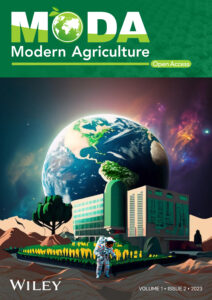
Last year, Lucas published his first paper and also made it to the cover of the journal (https://onlinelibrary.wiley.com/doi/full/10.1002/moda.20). In addition to his research, Lucas has been involved in teaching first and third year undergraduates the two last semester. Recently, he was appointed President of the HDR student Society of his research institute (AgriBio Student Society). He is also the student representative of the Website and Communications Sub-Committee (WCSC) and co-editor of Phytogen for ASPS
Image: Cover art for Modern Agriculture: Volume 1, Issue 2 designed by Lucas Auroux.
More information on the issue is available at Modern Agriculture: Vol 1, No 2 (wiley.com)
Editors’ note:
Phew that was a lot for one issue! Phytogen will be back for our next issue in late September. Don’t forget, registration and abstract submission for the local ASPS meetings for each state/territory in Australia and New-Zealand are now open.

Superstars of Science and PhD opportunity
26 August 2024
Hello ASPS members,
A new PhD opportunity has been posted on our job board. You can access the job board HERE!
|
|
||||||||||||||
|
|
||||||||||||||
|
|
||||||||||||||
|
||||||||||||||
|
||||||||||||||
|
||||||||||||||
|
|
||||||||||||||
|
||||||||||||||
|
Phytogen out now
01 August 2024
July edition
31 July 2024
Welcome to the July 2024 edition of Phytogen!
With the colder months upon us there are plenty of amazing scientists to celebrate. This issue we have plant-microbe interaction news courtesy from Dr Stephanie Watts-Fawkes
Then, a major part of this issue will spotlight students awardees of the travel grant of the International Plant and Molecular Biology (IPMB) conference held in Cairns last month.
Lastly, we have launched a new section dedicated to highlighting our student members. Our first student contributor is Zane Marks who is the ASPS student representative. If you would like your or your students’ work highlighted in Phytogen and social media, please contact our editors Razlin (razlin.azman@csiro.au) or Lucas (l.auroux@latrobe.edu.au).
Plant-Microbe Interaction Representative
Dr Stephanie Watts-Fawkes
Update from Plant-Microbe Interactions representative
Stephanie Watts-Fawkes
During the 2023 ASPS meeting in Hobart, I had the pleasure of co-chairing the “plant nutrition and beneficial plant-microbe interactions” session along with previous discipline representative, Assoc. Prof. Eloise Foo. We heard from invited speaker Dr Dugald Reid (La Trobe University) who gave us an overview of his research over the last few years on genetic strategies to enhance nitrogen fixation. Later in this article, I will highlight a recent publication from Dr Reid’s research. During the session, we were also presented with research from the rhizobial and mycorrhizal domains by several ECRs including PhD students Karen Velandia (UTAS) and Thi Diem Nguyen (University of Adelaide), and postdoctoral researcher Dr Tess McBride (Western Sydney University). It was a well-received session, and we now look towards planning of the 2024 ASPS satellite meetings.
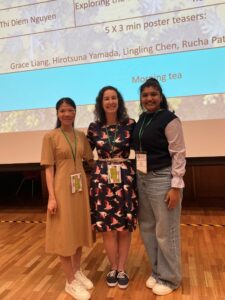
Caption for image: Ms Thi Diem Nguyen, Dr Stephanie Watts-Fawkes, Ms Rucha Patil at the conclusion of the plant-microbe interactions session at ASPS 2023.
In June, there were two landmark publications released by Australian researchers (led by two ASPS discipline representatives) that have made fundamental contributions to our understanding of plant-microbe interactions. A team at Western Sydney University’s Hawkesbury Institute for the Environment including first authors Drs Mingkai Jin and Kristine Crous (environmental ecophysiology representative) published their results from a six-year free air CO2 enrichment study in Nature. They found that a mature Eucalyptus forest subjected to elevated CO2 was phosphorus (P)-limited, due to competition with soil microbes for P, even though the trees were efficient at taking up and using P taken from the soil. This has implications for Australia’s old Eucalyptus forests as atmospheric CO2 continue to rise, with no ‘new’ P being deposited belowground.
In late June, a team led by Dr Dugald Reid (whole plant representative), in collaboration with researchers from Aarhus University, Denmark, published their work to identify and characterise the “fixation under nitrate (FUN)” transcriptional regulator, a ‘switch’ for nitrogen (N) fixation in legumes, in Nature. FUN was initially found through a genetic screen of some 150,000 plants through modulation of soil nitrate availability. The authors found that the activity of FUN, and thus the metabolic activity in root nodules, is dependent on internal zinc (Zn) concentration. A lower Zn concentration in nodules, which occurs when there are higher levels of nitrate in the environment (and less need for N-fixation), activates FUN, which then initiates the breakdown of the nodule. Identification of FUN has implications for designing legume crops that may continue to fix N even when soil N is not limiting, which may improve crop N use efficiency.
In the next few months, Australian beneficial plant-microbe researchers will be heading to the International Conference on Mycorrhiza in Manchester, UK (5th-9th August), and the International Conference on Legume Genetics and Genomics (30th Sept – 3rd Oct) and Australian Nitrogen Fixation Conference (4th – 5th Oct), both in Brisbane. In case you hadn’t heard, for the mycorrhiza enthusiasts the next edition of ICOM will be held in Cairns on the 13th-17th July, 2026, with Assoc. Prof. Jonathan Plett (Western Sydney University) spearheading the organisation of what is sure to be a wonderful event.
Editor’s note: You can read more about Stephanie’s research on the University of Adelaide profile page or follow her on X (@myco_research) for her research updates.
Student travel grant awardees report – IBMP Cairns 2024
Hanh Vo – Utas (TAS)
The International Plant Molecular Biology (IPMB) Congress 2024 was an unforgettable experience. This was an amazing opportunity for me to strengthen current network and made new connections. As someone who is in the last stretch of her PhD project, I had the chance to share my work so far, and talked to possible new employer for my postdoc. Moreover, many students also were also at the conference, which was encouraging and helped me to gain confident for networking. I was lucky to have the ASPS grant to travel and selected
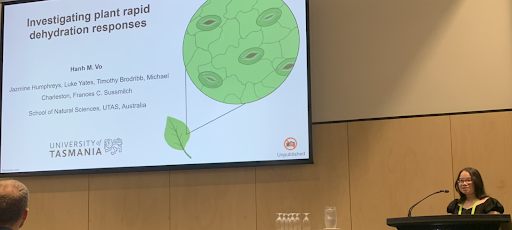
from competitive abstracts to give a ten-minute talk in the “Water, Drought and Heat Stress” session on Thursday. The presentation went well, and I got some good, thoughtful questions after to answer and think about. Overall, I love the opportunity, and would like to thank ASPS for the student travel grant and my supervisors for helping me with the presentation.
Linh Ton – UWA (WA)
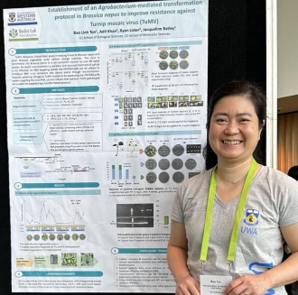 I deeply appreciated the support from ASPS through Travel Grant 2024 and the financial support from GRS-UWA, which enabled me to attend the IPMB 2024 in Cairns. Attending such a huge congress in plant molecular biology at the Cairns Convention Centre was an amazing experience during my PhD journey. It was a great opportunity for me to connect with researchers around the world. I presented my poster on establishing an Agrobacterium-mediated transformation protocol in canola (Brassica napus) to improve resistance against Turnip mosaic virus (TuMV) and had the opportunity to talk to other researchers with a similar research focus. The plenary talks and presentations covered the emerging technologies and current topics in plant molecular biology. I was thrilled to know about the updates on RNA biology studies and their application in plant protection against plant pathogens. I was surrounded by the energetic and stimulating atmosphere until the last talk by Sir David Baulcombe on his lifelong studies on RNA biology. I am looking forward to attending the next IPMB conference, which will be in China.
I deeply appreciated the support from ASPS through Travel Grant 2024 and the financial support from GRS-UWA, which enabled me to attend the IPMB 2024 in Cairns. Attending such a huge congress in plant molecular biology at the Cairns Convention Centre was an amazing experience during my PhD journey. It was a great opportunity for me to connect with researchers around the world. I presented my poster on establishing an Agrobacterium-mediated transformation protocol in canola (Brassica napus) to improve resistance against Turnip mosaic virus (TuMV) and had the opportunity to talk to other researchers with a similar research focus. The plenary talks and presentations covered the emerging technologies and current topics in plant molecular biology. I was thrilled to know about the updates on RNA biology studies and their application in plant protection against plant pathogens. I was surrounded by the energetic and stimulating atmosphere until the last talk by Sir David Baulcombe on his lifelong studies on RNA biology. I am looking forward to attending the next IPMB conference, which will be in China.
Juel Datta – QUT (QLD)
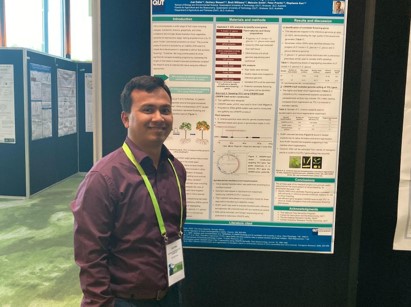 I am in my second year of PhD at the Queensland University of Technology (QUT). My main objective of the PhD research is to understand the molecular mechanisms of juvenility in Citrus using different biotechnological approaches. Recently, I had the opportunity to visit and to present my research as poster at the International Congress on Plant Molecular Biology (IPMB 2024) in Cairns, Australia. To attend the event, I received a travel award from the Australian Society of Plant Scientists (ASPS). The program brought like-minded scientists around the globe to know and share about the current plant molecular research. Undoubtedly, it was a perfect place for networking for the early career researchers and students. The plenary sessions, oral and poster presentations by fellow scientists were outstanding and forward-looking for future opportunities. I am grateful to the host of IPMB, ASPS and QUT for providing a chance to attend such a conference.
I am in my second year of PhD at the Queensland University of Technology (QUT). My main objective of the PhD research is to understand the molecular mechanisms of juvenility in Citrus using different biotechnological approaches. Recently, I had the opportunity to visit and to present my research as poster at the International Congress on Plant Molecular Biology (IPMB 2024) in Cairns, Australia. To attend the event, I received a travel award from the Australian Society of Plant Scientists (ASPS). The program brought like-minded scientists around the globe to know and share about the current plant molecular research. Undoubtedly, it was a perfect place for networking for the early career researchers and students. The plenary sessions, oral and poster presentations by fellow scientists were outstanding and forward-looking for future opportunities. I am grateful to the host of IPMB, ASPS and QUT for providing a chance to attend such a conference.
Ejiro Evivie – ANU (ACT)
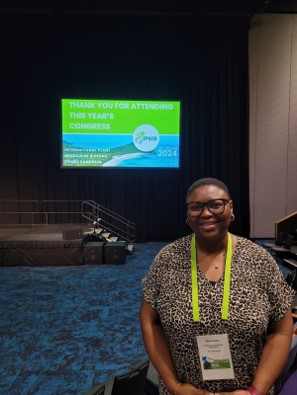 LinkedIn: Ejiroghene Evivie
LinkedIn: Ejiroghene Evivie
The 13th International Plant Molecular Biology (IPMB) Congress held in Cairns united plant scientists from around the world. Whether they be student researchers or experts, it was a full house of curious minds. Thanks to the ASPS for giving me a travel award that enabled me attend. The congress was inspiring and worthwhile as sessions covered a wide range of topics, from Mathematical Modelling in Plant Biology to Nanotechnologies. Gene editing, advancements in plant biotechnology and genetic engineering were not left out and generally covered in the Plenary sessions. There were abundant opportunities for networking. This enabled me to connect with peers who share similar research interests with me, exchange ideas, and create potential collaborations. Overall, attending the IPMB congress was deeply inspiring and renewed my enthusiasm for plant molecular biology. I returned home encouraged, driven to apply some knowledge and insights drawn from the conference in my own research.
Muhammad Mahmood – ANU (ACT)
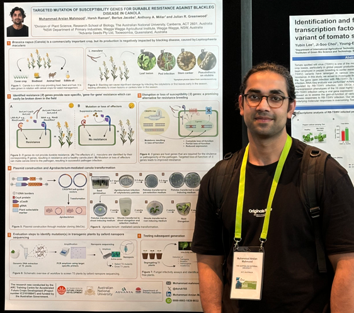 X: @duruk165
X: @duruk165
As a student interested in plant science, I was compelled to participate in the 13th International Plant Molecular Biology (IPMB) congress. This conference is a golden opportunity for students and researchers to showcase Australia’s science on the world stage of plant molecular sciences. I attended as a delegate representing the Australian Society of Plant Scientists (ASPS), which also sponsored my participation. This conference was immensely beneficial, enhancing my research experience, fostering relationships with fellow students, and facilitating interactions with other scientists and researchers. Conferences like IPMB provide a great platform to discuss on-going research with other scientists and get their insights. I was fortunate to be part of this prestigious conference and had the chance to present my research as a poster. This gave me the opportunity to discuss my work and establish collaborations with other labs. I am deeply grateful to ASPS to giving me a travel award to attend IPMB Congress and would encourage all researchers and students to participate in future conferences. These events provide a crucial platform for engaging with fellow scientists and students.
Student contribution
Zane Marks
PhD candidate, University of Adelaide
Socials: Linkedin
Seed priming is the exposure of seeds to an external agent to promote germination, abiotic stress tolerance and physiological benefits to plants1. Several types of priming exist including Nutri-priming (the use of micro or macro nutrients)2, Redox-priming (the use of an oxidative agent)3 and Hydropriming (the use of water as the agent). As a part of my PhD project, we are exploring these priming methods, both separately and in combination, in the re-emerging crop industrial hemp (Cannabis sativa). Industrial hemp is a fibre, flower, and seed crop recently reintroduced to Australia with many states making progress towards implementing the crop on a larger scale4. We investigated the cultivar Han Ne and documented how seed priming affected plant growth and productivity under drought stress conditions. It was observed that there was a significant difference (p<0.001) in seed yield and harvest index when combination primed compared to priming with water (hydropriming) under well-watered conditions. Further analysis on the seeds produced will help to establish whether there was any impact on seed quality, nutritional profiles, and stress tolerance. In future studies we aim to investigate what the underlying mechanisms of seed priming are in hemp and how they contribute to desirable phenotypes. We hope through this study that we can develop an accessible tool set to improve hemp performance for at home growers and farmers alike.
References:
- Farooq, M. et al. Seed priming in field crops: Potential benefits, adoption and challenges. Crop and Pasture Science 70, 731–771 (2019).
- Ali, N. et al. Micronutrient seed priming improves stand establishment, grain yield and biofortification of bread wheat. Crop and Pasture Science 69, 479–487 (2018).
- Hussain, S. et al. Redox priming alleviates dormancy and improves salinity tolerance of seeds and seedlings of medicinal halophyte Zygophyllum simplex L. Journal of Applied Research on Medicinal and Aromatic Plants 30, (2022).
- Schultz, C. J. et al. Consumer and health-related traits of seed from selected commercial and breeding lines of industrial hemp, Cannabis sativa L. Journal of Agriculture and Food Research 2, 100025 (2020).
Editors’ notes:
Look out for the next Phytogen edition in late August! In the meantime, please keep your eyes open for the local ASPS meeting that will happen in each state/territory in Australia and New-Zealand! Registrations and abstract submission will open soon…
“If you think in terms of a year, plant a seed; if in terms of ten years, plant trees; if in terms of 100 years, teach the people.”– Kong Qiu (Confucius, 551 BCE- 479 BCE), Chinese philosopher.
Newsletter written and edited by Lucas Auroux, Dr. Razlin Azman and Dr. Janet Wheeler.
June edition
30 June 2024
Hello ASPS members,
In this short edition of Phytogen we have a research profile from ASPS member Dr Francine Perrine-Walker (The University of Sydney). See below.
Rare gardening and botanical books for sale!
An expert gardener’s 50 yr lifetime collection of gardening books is for sale, the entire collection is worth around $6,000.
It includes rare and specialist horticultural and botanical books. Some of these are out of print and simply no longer available. Others are leather bound etc. There are also stunning coffee table picture books. The seller, Graeme, would prefer not to sell the books individually, but in large ‘chunks’ or as a complete set, as much is possible. Graeme is asking $3,500 for the entire gardening book collection, or for offers for parts of it. The books can be collected from Alphington, VIC 3078.
The final list and prices for the sale of this magnificent gardening book collection can be accessed HERE.
The list is also available as a google doc if the file is too large.
If you are interested in any of these books please contact Liz Boulton, 0407072480 or liz_boulton@hotmail.com
We are hoping these can go to someone who will obtain genuine value from them.
Research Profile: Dr Francine Perrine-Walker, The University of Sydney.
Investigating Plant-Microbe Interactions: A plant scientist’s stumbling guide using fluorescent stains and microscopy
Where does one begin when investigating the infection process of plant pathogens? My project investigated the interaction of the plant pathogenic oomycete, Phytophthora palmivora, with various horticultural crops such as cocoa.
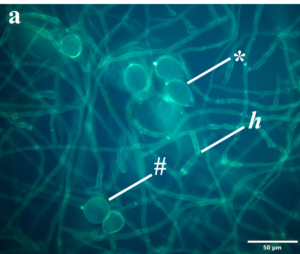
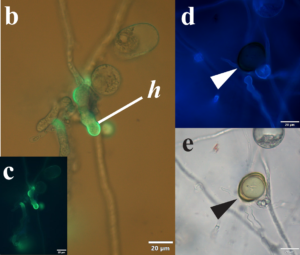
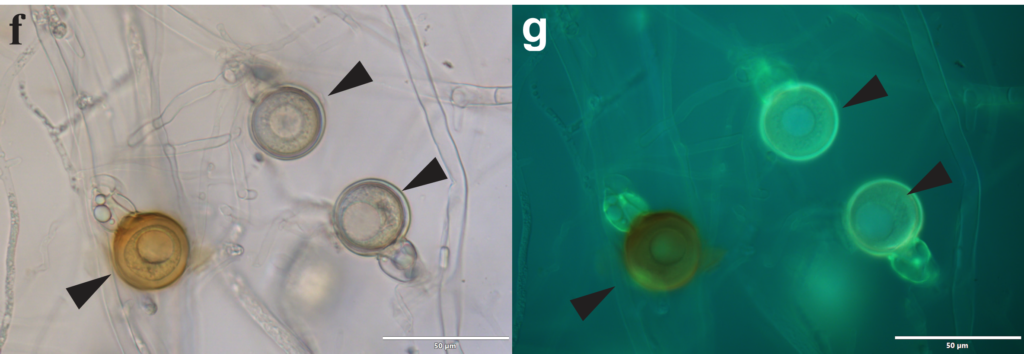
Phytophthora as a plant pathogen resembles true fungi as it forms hyphae (h) and spores as shown in Fig. (a and b).
In its asexual stage, Phytophthora sp. forms chlamydospores (#) which are thick-walled, long-term survival spores and sporangia (*) where short-lived, one-celled, flagellated zoospores are kept safe until fully developed for release in the presence of water.
In its sexual stage, the pathogen forms oospores (white and black arrowheads in Figs d-g) resulted from fertilization of the oogonium (female organ) by an antheridium (male organ). Some species are homothallic (self-fertile) while others are heterothallic i.e., requiring cross fertilization.
The marvel of this pathogen? Unlike true fungi, its cell walls contain cellulose instead of chitin! How does one tell them apart when infecting a plant cell?
In the absence of transformed lines with fluorescent tags such as the Green Fluorescence Protein, basic techniques can still shed some light on this pathogen’s cell wall structures. By growing them on agar plates and mating cultures, fluorescent stains such as Calcofluor White (CW) and Aniline Blue (AB) can be used to detect β-1,4-glucans such as cellulose and chitin (Fig.d) and
β-1,3-glucans (Figs. a, b, c and g) respectively. Note when stained with CW, cell wall structures appear blue while with AB, they appear yellow under fluorescence respectively. The latter is the most abundant form of β-glucans in the cell walls of plant
fungal pathogens and, β-1,3-glucans have been shown to act as MAMPs (microbe-associated molecular patterns)
and play a role in plant immune responses.
However, such methods cannot describe the dynamic changes in cell wall content during infection. This requires cutting edge molecular tools other than GFP in combination with high-end microscopy.
 Dr Francine Perrine-Walker (The University of Sydney)
Dr Francine Perrine-Walker (The University of Sydney)
May edition of Phytogen, Congratulations to Prof Ros Gleadow and Prof Keiko Torii
31 May 2024
Hello ASPS members,
The May edition of Phytogen can be downloaded HERE!
Congratulations to Professor Ros Gleadow who has been elected as a 2024 Fellow of the Australian Academy of Science. Ros also served as President of our Society between 2010 and 2012.
In April ASPS Corresponding member Professor Keiko Torii was elected to the US National Academy of Sciences. In May Professor Torii also received the Medal of Honor with Purple Ribbon conferred by the Emperor of Japan at the Imperial Palace. Congratulations Professor Torii from the Australian Society of Plant Scientists.
More on these two plant scientists in the June edition of Phytogen.
The latest STA newsletter can be accessed HERE.
May Edition
31 May 2024
Welcome to the May edition of Phytogen!
Winter is coming… all over Australia, but the Society continues to shine thanks to its dedicated members. This issue highlights Dr Dugald Reid’s (ASPS whole plant representative contribution) newly installed laboratory at La Trobe University, as well as Dr. Neeta Lohani’s Science Meets Parliament 2023 report and Dr Celine Mens’ R.N. Robertson Travelling Fellowship 2023 report.
Whole Plant Representative contribution
Dugald Reid, Group Leader, School of Agriculture, Biomedicine and Environment, La Trobe University.
Overview of legume nodulation projects at La Trobe University.
Dr. Penelope Smith and Dr. Dugald Reid work on symbiotic nitrogen fixation in legumes at La Trobe University in Melbourne. The lab uses a combination of Molecular Biology, Genetics, Genomics and Biochemistry and now have six legume species growing in the lab. Below is a snapshot of some of the people involved and their projects.
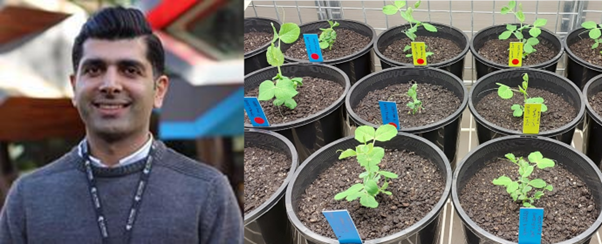
Meysam Khodaparast Afarmajani (above) has recently finished his PhD and has just started a project analysing variation in nitrogen fixation efficiency in diverse pea and lentil germplasm.
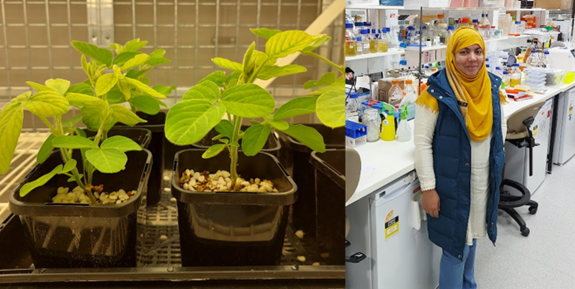
Sumaira (above) is a PhD student investigating the role of transporters in symbiotic nitrogen fixation in soybean.
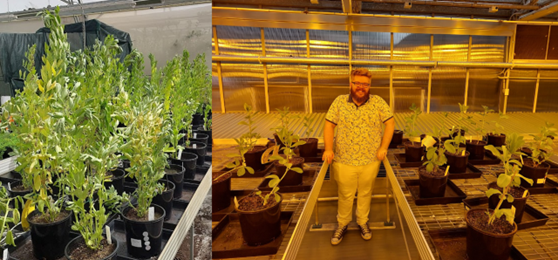
Jacob Heath Golder (above) is purifying faba bean lines for a diversity panel while conducting his Masters project on zinc transporters.
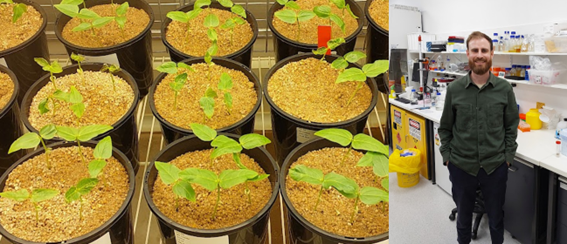
Dr. Ronan Broad (above) is a postdoc evaluating the impact of removing environmental suppression of nitrogen fixation via gene editing in cowpea and soybean.
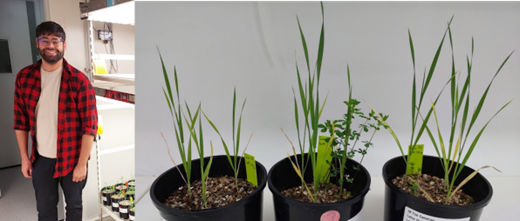
Dr. Tim Cameron (above) is a postdoc investigating the control of nodule function via DAP-seq while establishing a model system to study nitrogen dynamics in intercropped legume-wheat.
Science Meets Parliament 2023 report
Dr. Neeta Lohani, Associate Research Fellow in Agriculture & Plant Science, Food Sciences, Western Sydney University, Richmond, NSW, Australia.
Current Affiliation: Postdoctoral Research Associate, Donald Danforth Plant Science Center, St. Louis, Missouri, USA.
As a scientist interested in the intersection of science and policy, I was compelled to participate in the Science Meets Parliament (SMP) event. This annual gathering fosters discussions between scientists and policymakers on the role of science in shaping Australia’s future. I attended as a delegate representing the Australian Society of Plant Scientists (ASPS), which also sponsored my participation. The event was immensely beneficial, enhancing my advocacy skills, fostering relationships with policymakers, and facilitating interactions with fellow scientists and researchers.
Before the main event in Canberra, I took part in a 3-day virtual program featuring keynote speeches and panel discussions with distinguished scientists, politicians, and policy experts. This preparatory program provided insights into the policy landscape and honed our communication skills. A notable highlight was the presentation by UCLA Professor Terence Tao, regarded as the world’s foremost living mathematician and the 2022 Global Australian of the Year.
The day at Parliament was filled with various activities, starting with a session led by Dr. Cathy Foley, Australia’s Chief Scientist, and Nobel laureate Brian Schmidt. They discussed their experiences in science and its critical role in addressing complex challenges and shaping the future. This was followed by a panel emphasizing the need for collaboration between the scientific community and industry in Australia. I also participated in the parliamentary question time, an enlightening experience. Later that evening, we attended the national gala dinner, which provided a fantastic opportunity to network with prominent scientists and parliamentarians. The dinner included speeches from key government figures such as Richard Marles (Deputy Prime Minister), Ed Husic (Minister for Industry & Science), and Karen Andrews (Shadow Home Minister). A statement by The Hon Ed Husic MP struck a chord with me: “Science isn’t a ‘nice to have’ only when times are good. It is essential to the prosperity of this country, to our national wellbeing, and to a modern economy.” For me, the gala’s highlight was Paul Girriwah House’s didgeridoo performance.
Attending SMP was incredibly valuable for me as both a scientist and an advocate. I am deeply grateful to ASPS and would encourage all researchers to participate in this event, as it provides a crucial platform for engaging with policymakers, underscoring the significance of our scientific endeavours, and fostering collaborations that support evidence-based decision-making.
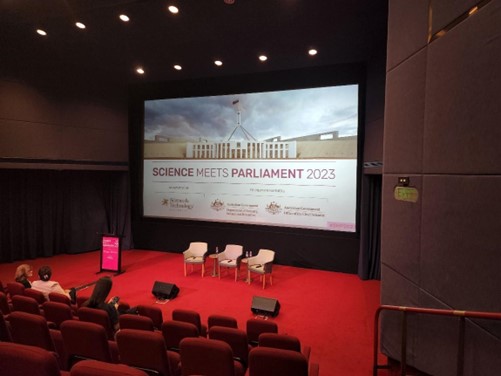
First day and opening event of SMP in person 2023.
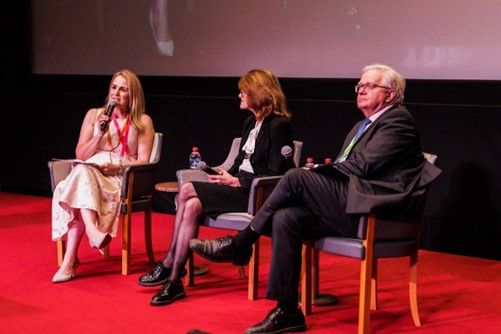
From left to right: Misha Schubert (CEO, Science & Technology Australia), Dr. Cathy Foley (Australia’s Chief Scientist), Nobel Laureate Brian Schmidt (Distinguished Professor and Vice-chancellor of the Australian National University).
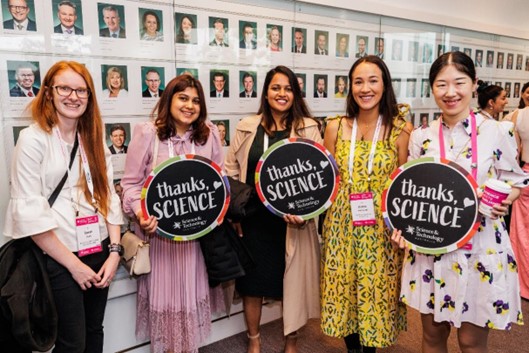
Dr. Neeta Lohani (in the center) with other women delegates at the SMP, 2023
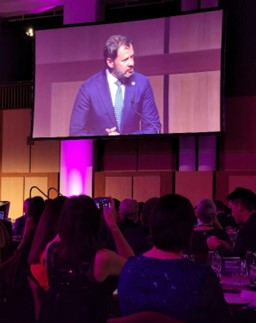
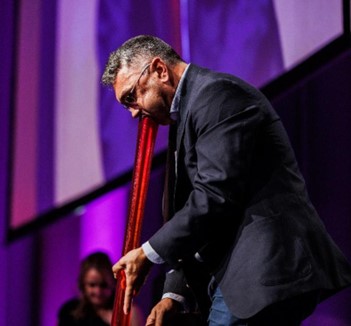
Minister for Industry & Science, The Hon Ed Husic MP and Paul Girriwah House, Ngambri Elder playing the Didgeridoo.
R.N. Robertson Travelling Fellowship report 2023
Dr. Celine Mens, The University of Queensland
I obtained my PhD in molecular plant biology at the University of Queensland in 2022 focussing on nitrogen-dependent regulation of legume nodulation. Since then, I started a postdoc position on legume genomics which involves creating a pan-genome as a tool to improve symbiotic nitrogen fixing efficiency in mungbean. To do so, I generated large amounts of HiFi PacBio and RNAseq data of eight mungbean accessions capturing genetic diversity in an Australian Nested Association Mapping (NAM) population to assemble into a mungbean pan-genome. We had planned to work with the bioinformaticians at the National Center for Genome Resources (NCGR) in Santa Fe, US to help us with the high-computing needed to create a pan-genome and make it publicly available. However, we recognised the importance of also having in-house expertise and knowledge for genome analysis and interpretation within our team.
I had the opportunity to visit NCGR for two weeks with the support of the R.N. Robertson Travelling fellowship in March 2024. The team at NCGR manage the Legume Information System (LIS) which houses genome data for commonly researched legumes like mungbean, cowpea, soybean and peanut. They curate the sequences and provide links between data storage and tools like BLAST as well as tools their team have developed like the Genome Context Viewer. I had the chance to immerse myself in the world of bioinformatics with someone on hand to help trouble-shoot every error that popped up in the HPC (High Performance Computing) terminal. They took me through every step needed to go from sequencing data to a structurally and functionally annotated genome, as well as creating a user-friendly interface that would allow data sharing with my supervisor and colleagues that did not require a terminal interface. While in the same time-zone, I was also able to attend a workshop on differential gene expression run by NCGR while my analyses were running in the background. My PhD research did not rely as heavily on bioinformatics and it has been great to expand my skillset in this way.
On my weekends, I had the chance to explore the beautiful city of Santa Fe with its rich cultural history, the New Mexico landscapes, and the snowy mountains in southern Colorado.
I would like to express my gratitude to the Australian Society of Plant Scientists, the R.N. Robertson Fund and the University of Western Australia for providing me with the funds to visit NCGR. I would also like to give a big thank you to Andrew Farmer and Joann Mudge for their help and time invested, and their continued involvement in this research. Lastly, I would also like to thank my supervisor Michael Udvardi for his support and helping me connect with the team at NCGR.
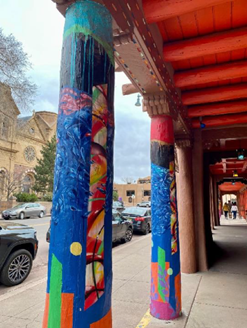
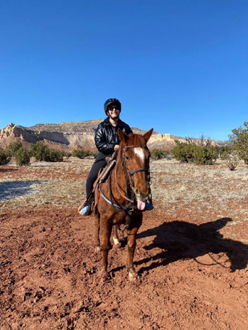
Indigenous art in the town centre of Santa Fe (left) and horseback riding on the weekend in the beautiful New Mexican country (right).
Look out for the next Phytogen edition in late June! In the meantime, we’re looking forward to seeing Australian Plant Scientists at IPMB in Cairns!
“The secret of improved plant breeding, apart from scientific knowledge, is love” – Luther Burbank (1949-1926), American botanist.
Newsletter written and edited by Lucas Auroux and Janet Wheeler.
April Edition
24 April 2024
This month in Phytogen we introduce our new Website and Communications Sub Committee including the new editors of Phytogen, Razlin Azman and Lucas Auroux.
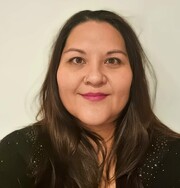

Fascination of Plants day is 18th May 2024. Get in contact with Scott Boden if you have ideas or want to get involved.
We have the first 2024 Science Meets Parliament report for Lim Chee and the 2023 ASPS Education and Outreach Award report by winners Robert Sharwood, Michelle Donovan-Mak, Jayakumar Bose, David Randall, Jing He, Oula Ghannoum and Zhonghua Chen.
Announcing an extension to 2024 ASPS award applications to Sunday April 28th for the;
ASPS Education and Outreach Award
R.N. Robertson Travelling Fellowship
And a call to join ASPS members Matt Gilliham and Michelle Watt on the ARC College of Experts. Nominate HERE.
Science Meets Parliament 2024 report
Lim Chee Liew, School of Agriculture, Biomedicine and Environment, La Trobe University.
In March 2024, I had the pleasure of representing the Australian Society of Plant Scientists (ASPS) as a delegate to the Science Meets Parliament (SMP), an annual event at the parliament house, Canberra, organised by Science and Technology Australia (STA). This year was the biggest ever event with 360 delegates, 90 Parliamentarians, and more than 50 amazing speakers.
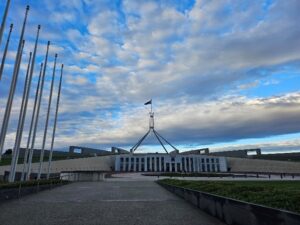
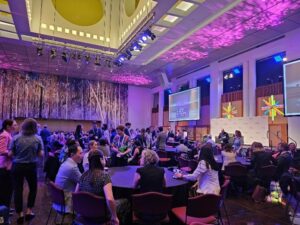 Over the two-day event, I have the opportunities and privileges to hear from leaders and policy maker about how to play an active role in shaping our scientific policies and future. One of the highlights was the incredible speech by Australia’s Chief Scientist Dr Cathy Foley who emphasised the fundamental science is equal to if not more important than translational science because of the social benefits and “be a well and not a waterfall of expertise” to engage effectively with parliamentarians and public as an expert. Minister of industry and science, Ed Husic acknowledged Australian researchers for advancing science, health and tech and announced new STEM funding that supports for collaboration with research institutes in Asia and the passing of Australian Research Council Amendment Bill 2023 in Parliament. On top of these, I was really impressed by the insightful National Press Club addresses from STA president Prof Sharath Sriram which highlighted the need of Australia to boost R&D spending to 3% GDP as a bold investment to create an innovation ecosystem and more job opportunity of high value jobs. “Be a smart country, rather than a lucky one” was my take home message from Prof Sharath Sriram.
Over the two-day event, I have the opportunities and privileges to hear from leaders and policy maker about how to play an active role in shaping our scientific policies and future. One of the highlights was the incredible speech by Australia’s Chief Scientist Dr Cathy Foley who emphasised the fundamental science is equal to if not more important than translational science because of the social benefits and “be a well and not a waterfall of expertise” to engage effectively with parliamentarians and public as an expert. Minister of industry and science, Ed Husic acknowledged Australian researchers for advancing science, health and tech and announced new STEM funding that supports for collaboration with research institutes in Asia and the passing of Australian Research Council Amendment Bill 2023 in Parliament. On top of these, I was really impressed by the insightful National Press Club addresses from STA president Prof Sharath Sriram which highlighted the need of Australia to boost R&D spending to 3% GDP as a bold investment to create an innovation ecosystem and more job opportunity of high value jobs. “Be a smart country, rather than a lucky one” was my take home message from Prof Sharath Sriram. 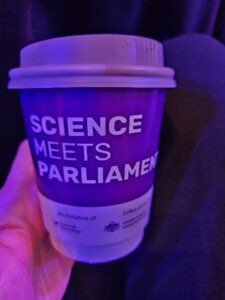
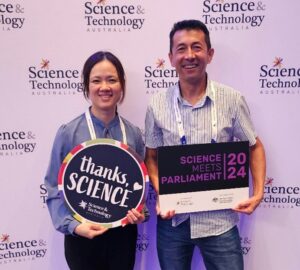
There is more work to be done in order to bridge the gap on what the parliamentarians do and what we scientists know through science communication and engagement. As scientists, we need to be equipped with advanced skills in policy engagement, communications, advocacy, and influence. Feyi Akindoyeni on the panel of advocacy also stressed on communication being persuasion, cut through and relevance, build a relationship and make sure your ask is clear. I have also increased my understanding about how scientists can engage with the media from media representatives and science communicators Brandon How, Donna Lu, and Nate Byrne. CEO of CSIRO, Doug Hilton highlighted the importance of collaboration by using metaphor of “just like food, science is much better, and far more enjoyable, when shared”.
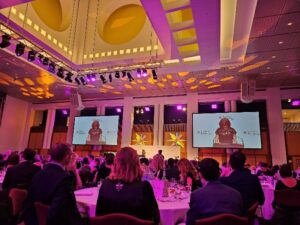
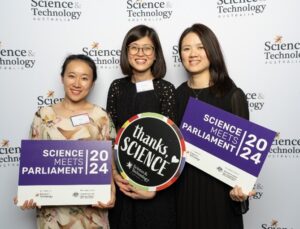 On top of the excellent seminars and talks, the Gala Dinner at the Great Hall, Parliament House was the networking highlight of the SMP. I got my opportunities to engage with scientists and parliamentarians from different area of expertise. Attending Question Time was another highlight for me where I get to watch Parliament in action in person.
On top of the excellent seminars and talks, the Gala Dinner at the Great Hall, Parliament House was the networking highlight of the SMP. I got my opportunities to engage with scientists and parliamentarians from different area of expertise. Attending Question Time was another highlight for me where I get to watch Parliament in action in person.
It was a great honour to represent ASPS to attend SMP2024. It was a great fun and eye-opening event! It provided me an excellent opportunity to learn about communicating and engaging with policy makers and also to network with scientists from diverse area of STEM.
2023 ASPS Education and Outreach Award winners report.
Ensuring Food Security Through Innovative Food Production at Western Sydney University.
The Team: Robert Sharwood, Michelle Donovan-Mak, Jayakumar Bose, David Randall, Jing He, Oula Ghannoum and Zhonghua Chen.

Image – From Left to Right: Michelle Donovan-Mak, Jing He, Zhonghua Chen, Jayakumar Bose, Robert Sharwood, Oula Ghannoum and David Randall.
Summary:
Our team has created an innovative learning environment tailored to current and future leaders in the horticulture, plant biology, and food science sectors with the long-term vision of providing healthier, and more sustainable, plants and food. In 2017, Western Sydney University and Horticulture Innovation jointly established the National Vegetable Protected Cropping Centre (NVPCC), which is used to train the next generation of growers, food practitioners, plant scientists, corporate leaders and educators. We developed three courses to bridge the protected cropping career pathway gap, Graduate certificate, Graduate diploma, and Master of Science with relevant majors. Industry informed and tailored subjects use innovative pedagogical approaches, including: flexible learning, online learning pods, and live flipped-learning tutorials. Academic materials are presented in multiple forms to engage all VARK learning styles, visual (YouTube, pictorial, graphical) audio (sound clouds, recorded lectures), reading/writing (written documents, checklists, writing tasks), kinaesthetic (hand-on practical in greenhouses, laboratories, entomological field collections).
ASPS awards closing 28th April, Phytogen out now and call for ARC College of Experts nominations
24 April 2024
Hello ASPS members,
2024 ASPS awards are closing Sunday April 28th. These include;
- Peter Goldacre Award
- Jan Anderson Award
- Education and Outreach Award
- R.N.Robertson Travelling Fellowship get your applications in.
The April edition of Phytogen is out now and can be accessed HERE. This issue includes a report on Science Meets Parliament by Lee Chin and a report on the 2023 Education and Outreach Award winners Robert Sharwood, Michelle Donovan-Mak, Jayakumar Bose, David Randall, Jing He, Oula Ghannoum and Zhonghua Chen.
Nominate to join the ARC College of Experts. There have been many ASPS members in the past. Join current ASPS members Matt Gilliham and Michelle Watt ensuring the value of plant research is recognised. More information on the ARC College pf Experts and nomination details can be found HERE.
April update
05 April 2024
THE DAVID SYME RESEARCH PRIZE
Nominations are now invited for the 2023 David Syme Research Prize. The Australia-wide prize recognises the best original research in Biology, Physics, Chemistry or Geology produced* in Australia during the past two years (1 January 2022 – 31 December 2023).
*Produced – e.g. published
The David Syme Research Prize is managed by the Faculty of Science at the University of Melbourne.
Summary details are:
Value: approx. $10,000, and a medal
Closing date: 30 April 2024
- The prize is made by nomination only. Senior members of the academic or research community such as co-authors or co-researchers, heads of department or deputy vice-chancellors (research) are invited to nominate eligible colleagues. Self-nominations are not accepted.
- Researchers associated with any Australian university and researchers without university connections are eligible for nomination, noting that the following are not eligible:
– Professors or researchers who will have attained the position of professor at the time the award is made;
– Researchers outside universities who will have attained a level of seniority comparable to a university professor at the time the award is made (LEVEL E);
– Researchers who have not spent the equivalent of at least 5 full years of the last 7 in Australia.
- The award is made on the basis of the research quality within the discipline and its likely impact and value in the industrial and commercial interests of Australia.
Full details and the nomination form are available at: https://scienceunimelb.smartygrants.com.au/DSyme2024
Enquiries should be directed to: science-internalfunding@unimelb.edu.au
Recent Posts
Tags
Archives
- June 2025
- May 2025
- April 2025
- March 2025
- February 2025
- January 2025
- December 2024
- November 2024
- October 2024
- September 2024
- August 2024
- July 2024
- June 2024
- May 2024
- April 2024
- February 2024
- January 2024
- November 2023
- October 2023
- September 2023
- August 2023
- July 2023
- June 2023
- May 2023
- April 2023
- March 2023
- February 2023
- December 2022
- November 2022
- October 2022
- September 2022
- August 2022
- July 2022
- June 2022
- May 2022
- April 2022
- March 2022
- February 2022
- January 2022
- December 2021
- November 2021
- October 2021
- September 2021
- August 2021
- July 2021
- June 2021
- April 2021
- March 2021
- February 2021
- January 2021
- December 2020
- November 2020
- October 2020
- September 2020
- August 2020
- July 2020
- June 2020
- May 2020
- April 2020
- March 2020
- February 2020
- January 2020
- December 2019
- November 2019
- October 2019
- September 2019
- August 2019
- July 2019
- June 2019
- May 2019
- April 2019
- March 2019
- February 2019
- January 2019
- December 2018
- November 2018
- October 2018
- September 2018
- August 2018
- July 2018
- June 2018
- May 2018
- April 2018
- March 2018
- February 2018
- January 2018
- December 2017
- November 2017
- October 2017
- September 2017
- August 2017
- July 2017
- June 2017
- May 2017
- April 2017
- March 2017
- February 2017
- January 2017
- December 2016
- November 2016
- October 2016
- September 2016
- August 2016
- July 2016
- June 2016
- May 2016
- April 2016
- March 2016
- February 2016
- January 2016
- December 2015
- November 2015
- October 2015
- September 2015
- August 2015
- July 2015
- June 2015
- May 2015
- April 2015
- March 2015
- February 2015
- January 2015
- December 2014
- November 2014
- October 2014
- September 2014
- August 2014
- July 2014
- June 2014
Copyright 2017 Australian Society of Plant Scientists Disclaimer & Privacy
Website by Michael Major Media




